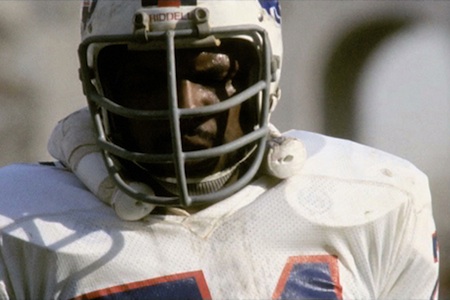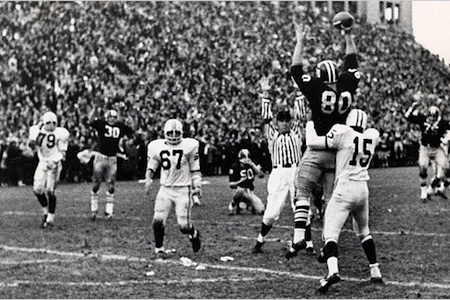What would the NFL be today without NFL Films? Now in its 50th year, NFL Films took a professional pastime and ascended it into the realm of legendary drama. Developed by such Promethean talents as producers Ed and Steve Sabol and narrator John Facenda, NFL Films imbued the gridiron game with the powers of cinematic storytelling, divine narration, intimate field footage and production values of the highest order. NFL Films has been called “the greatest PR machine in professional sports history, one that could make even a tedious stalemate seem as momentous as the battle of the Alamo.”
But if you stripped away the glamour and polish of these productions, what would a football movie look like, and what interest would it hold?
One might find an answer in the acclaimed documentary Harvard Beats Yale 29-29. The film revisits one of the most thrilling college games ever played, back when Yale was a nationally ranked team, facing off against underdog and archrival Harvard. It’s a modest production that lacks the dramatic music, voice of god narration or high quality game footage you’d expect of a sports movie. Instead, it simply interviews the game’s players. One of them happens to be Tommy Lee Jones, who played guard on the Harvard team. But the Oscar winning actor is upstaged by his teammates and foes, who vividly recall every moment and how it would shape their character for a lifetime. What emerges is how one game of football changed its players from within, throwing them into a moment much larger than themselves and making them into men.
Video essay: Out of Bounds? Making Football Movies Outside the NFL
But another film, Blood Equity, shows the unmaking of men through the longterm effects of professional football. The film exposes the preponderance of mental and physical illnesses plaguing retired NFL players, as well as the resistance of the NFL Players Union to compensate these injuries. The film is produced by NFL veteran Roman Phifer but without the support of the league, which meant that he couldn’t use any footage of NFL games. With those glamorous scenes left on the sidelines, what we see instead are ex-superstars reduced to shells of their former selves: Hall of Fame players descending into dementia, unable to recall their past exploits or even recognize their own families. It’s a side of the game that the NFL doesn’t want you to see, though they spotlight and even glorify its causes every Sunday. A film like Blood Equity forces us to confront head on the seductive aura of professional football and what human value we truly hold for the men who play it.
Kevin B. Lee is Editor in Chief of IndieWire’s PressPlay Video Blog, Video Essayist for Fandor’s Keyframe, and a contributor to Roger Ebert.com. Follow him on Twitter.





